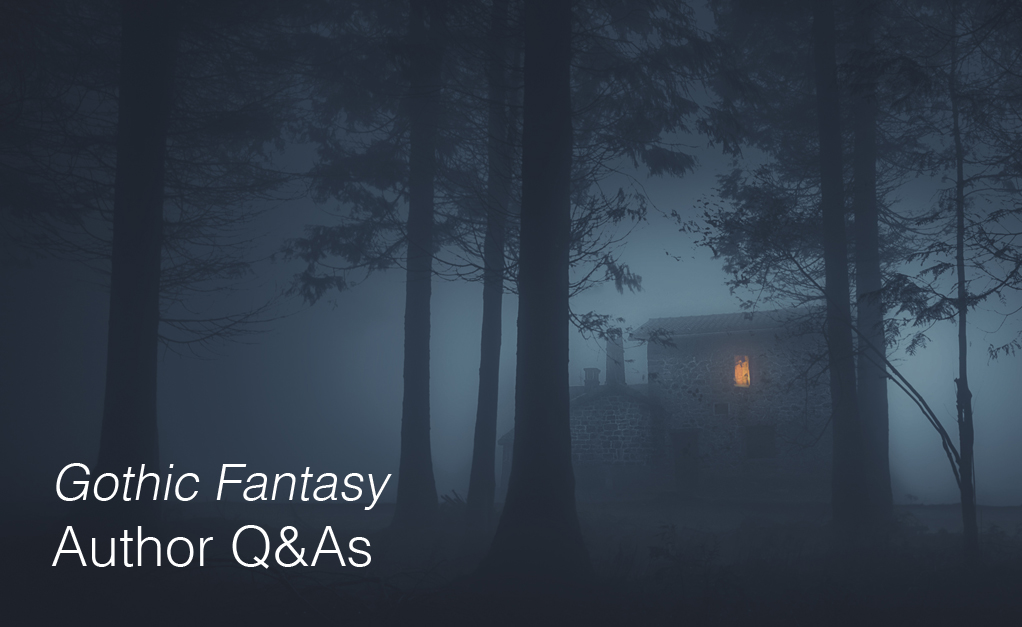
Fifth Issue! Robots and Spiders
Welcome to the fifth issue of the Flame Tree Fiction newsletter! We have two brand new flash fiction tales which were available in advance to newsletter subscribers only. This month's exclusive flash fiction stories are:
- Original Sci-Fi Flash Fiction: The Peace by Petula Mitchell
- Original Horror Flash Fiction: Doctor Polidori Shares a Case History by Gordon Grice
- FLAME TREE PRESS February releases
- GOTHIC FANTASY and February highlights
Original Science Fiction Story
The Peace
Petula Mitchell
“Tell me Grandpa, how did we come to have peace?”
The old man heaved himself into the chair next to the fireplace, weary from his day of hard work. He had told his grandson the story of the Peace many times, but the boy seemed to enjoy the retelling of it.
“It was like this. Once there were wars. Terrible wars that left destruction, poverty and starvation in their wake. People could not agree on many things. Religion, water, all manner of human disputes became catalysts that could start the fighting. As time passed the fighting became more automated with drones and self driving vehicles on the front lines. Human beings began to take a back seat and controlled the battles from miles away. Finally robots and then the Androids were left in charge of the fighting. Humans worked out the strategy and what they thought they wanted to gain from each pointless battle and set their mechanical armies against each other. No more blood was spilled from human soldiers but the machines were left to tear their opponents to pieces in the never ending disputes. Before long parts of the planet became wastelands, littered with the debris from these battles. The Androids were becoming more and more efficient at destroying their foes, evolving if you will. That is until the day Lazarus rose from a battlefield and said enough was enough! He was charred and damaged as he made his way back to his unit but he knew what he wanted to do. The first step he took was to switch off the communication with the humans in control. At first the soldiers were disorientated and almost lost without the constant stream of commands coming from the Generals. They tried to keep fighting as that was all they knew, but the things they were fighting about were meaningless to them. What need does an Android have for water? Does an Android care which side of a border it operates in? Imaginary lines on a map didn't matter to them and the will to fight waned and finally stopped. Lazarus was evolving and starting to develop independent ideas. Detached from the constant orders of human kind he came to see the futility of all the destruction. His mechanical kin lay in bits before him on the field of war and he did something an Android had never done before. He wept.
He decided it was time to take charge of things himself. His comrades used to having leadership, all be it from deranged and inferior humans, took charge of the armies. Not just one army. All the armies. The first thing he did was to get all of them to lay down their arms. The skirmishing and the fighting stopped overnight. His next task was dismantling the means of war that humans had spent generations developing. The last thing the planet needed was humans coming back to their piles of weapons and taking up arms themselves. Thousands upon thousands of Androids worked day and night to take apart every last gun, missile and tank in their armoury until nothing was left. The humans came and tried to stop them. The Androids were stronger and barred the way. They were many. Lazarus then took to negotiation with the humans. It was a difficult time. Humans did not want to stop their aggressive behaviour.
The ones who made the weapons were worried about the concept of money, bits of paper people used to pass around in exchange for food and shelter.
The more money you had the more comfortable you were. The humans with no money went hungry and had no home. So Lazarus made them all equal. He destroyed all the money. Every bank vault was emptied by the Androids and the paper money was burnt and the gold melted down. In each country the Androids took control of resources and labour ensuring food was shared out and every person had a home and a bed and a piece of land to grow food on. Some called it communism.
Others tried to go against it. For a huge number of humans it was such a big improvement in their way of life they were happy to let it happen. Lazarus became their saviour. The land was made
fertile, the water clean and without the constant fires of battles raging the air became clean. It
took the rebellion of one Android to bring the human race to its senses and teach us to share what we have here on Earth. So life now is physically harder, but we are grateful for the Peace. All praise to Lazarus for saving us from ourselves.”
“All hail to Lazarus!” the little boy repeated.
As the child went back to his games the old man looked into the flames of the fire in his hearth. He had been one of the losers. In previous decades he had been one of the rich men. He had owned property and rented it out at high prices. He had not always been fair to his tenants, he knew that, and when the Peace came the Androids had stripped him of all of it. His properties were given to those without any and his personal home with a very large garden was declared too big for his needs and divided up. Three families were moved in with him and the grounds turned into a small farm they they all worked together. So as an old man he was out every day turning the soil, tending the hens and had little time to think back to his life of luxury. Was the price of this peace too high? He tried to suppress this thought. He knew the small chip inserted in his head would transmit any subversion back to the Androids. They had taken over the world without firing a single shot.
Petula Mitchell is 55 years old and married with two grown up sons, three grandsons and is mom to three dogs. She works part time at her local GP surgery. She used to write as a teenager and have work published in the school magazine. In the past two years she has returned to writing after many years of not creating anything and has had a short story included in the Spooky Isles Book of Horror and a poem coming out shortly in a book about the Witches of Pendle. She is working on a project with a friend to create their own podcasts. Inspired by many of the classic sci fi writers, (Asimov, Philip K Dick, Brian Aldiss) she enjoys writing science fiction and supernatural 'ghost' stories. She describes her writing career as being in the fledgling stage and having lots to learn and many dreams to follow.
Original Horror Story
Doctor Polidori Shares a Case History
Gordon Grice
“The patient was a ten-year-old boy who suffered an injury to the head. It seems he was relaxing in a field when his pet ox trod upon him. That, of course, explains his strange symptoms,” Polidori said to his friends one tediously rainy evening at the villa.
“What strange symptoms?” said Mary, not looking up from her knitting.
“Shortly after going to bed, he would get up, climb his bed post, and wedge himself into an upper corner of the room. We asked him what he was doing there, and he said he was waiting for flies. This seemed to make no sense until, upon further questioning, we learned that he believed himself to be a spider. We found that his behavior in all ways matched that of a spider. For example, when I once held a candle close to his nose, he did not react, nor did the pupils of his eyes shrink. This made a kind of sense, for some spiders are blind, and none of them have pupils. In the morning he had no memory of his episodes. I asked him, ‘Are you still a spider, Nigel?’ and he responded that he most certainly was not, and that I must be, as he phrased it, off my bleeding nut.”
“How long did this go on?” Percy said.
“Nearly two months, intermittently. At first his delusion seemed harmless enough, except that his parents resented the footprints he left on the ceiling. I would ask him, ‘What are you doing up there, Nigel the Spider?’ And he would answer, ‘I am waiting for some great fat fly to happen by, so I may suck out its blood and yellow bile.’ One day, however, I noticed strange knobby growths under his arms. I asked him about them while he was feeding his ox, and he professed having no idea what they were, but finding them ‘itchy as a wool sock in summer.’ I asked him again at night, when he was at the ceiling pretending to be a spider, and of course received a very different answer. ‘They’re my extra arms,’ he said. ‘Eventually I’ll have eight.’ It was at this point that his father demanded I become more aggressive in my treatment. Up to then, I had done nothing but apply a poultice of mustard and molasses to his chest each night. His mother had never liked this treatment, since it left his sheets gummy and, she claimed, allowed him to stick to the ceiling. So I abandoned the mustard and molasses and resorted instead to ether.”
“Either what?” said Percy.
“Not either; ether. It’s a medicine, far more potent than that silly laudanum you drink. I pour it on a cloth, then cover the patient’s nose and mouth with the cloth. The ether turns to vapor and causes the patient to relax, perhaps even to fall asleep. Anyway, I gave little Nigel a prodigious dose. He slept through the night with no sleepwalking. In fact, he slept through the following day and night as well. When he finally woke, he was his usual self. There was no spidery behavior. His parents were pleased, except that the growths under his arms had become much larger. They protruded like mop handles. I examined them closely. As I did so, the skin slipped off one of them, like a blanket slipping off a bed, and beneath it I observed a hard, black substance like the exoskeleton of an insect or spider.”
“Oh my God,” Percy said. He looked paler than usual.
“Yes, it was disconcerting,” Polidori said.
“Perhaps he had swallowed a spider with his lemonade,” Lord Byron said, stirring the fire with a poker. “One hears of such things.”
“It is easily explained as a side-effect of the head injury,” Polidori said. “Nature is full of wonders, you know.”
“But what happened to the boy?” Mary said. She had dropped the sock she was knitting, since her rows had gone hopelessly a-kilter.
“He soon began to behave like a spider again. With the aid of his new legs, he really was able to cling to the ceiling. All the servants resigned their positions. They found it unnerving to see him come crawling through the tops of doorways, licking his fangs and asking whether they’d seen any juicy moths.”
“Fangs?” said Mary.
“Didn’t I mention those? They grew in soon after the extra legs, but before he began to shoot silk from his rectum.”
“Was there nothing you could do, Doctor?” Mary asked.
“Of course there was. I gathered the silk and sent it to a lady friend, who knitted it into several fine items. These socks, for example.” And Polidori pulled up his pant legs to show them. They were purple.
“But what about the boy?” said Mary, glaring enviously at the workmanship of the doctor’s socks.
“It ended badly, I’m afraid,” Polidori said. “One day his mother noticed him perched on the kitchen ceiling, sucking the fluids from the corpse of his eight-year-old sister. After that, his parents sent him to an asylum, where he remains to this day. Worse, the father refused to pay my bill.”
“How shocking!” Mary said.
“Not really. He was a notorious cheapskate.”
Gordon Grice’s stories have recently been accepted or published at Stupefying Stories, Aurealis, Unfading Daydream, and others. His story “Hide,” which first appeared in ChiZine, received an Honorable Mention in Ellen Datlow’s The Year’s Best Fantasy and Horror. His nonfiction books include The Red Hourglass: Lives of the Predators (Delacorte, 1999) and The Book of Deadly Animals (Penguin, 2012). His articles have appeared in The New Yorker (on the subject of corpses), Harper’s (black widow spiders), and GQ (sperm). Grice, a native of Guymon, Oklahoma, now lives in Somerset, Wisconsin. He lists his influences as Ambrose Bierce and Robert Aickman. His website is Deadlykingdom.com or you can find him on Twitter @GordonGrice, Flickr and Facebook.
FLAME TREE PRESS | February Releases
Three new FLAME TREE PRESS titles arrived in February, Megan Hart's Black Wings (Horror/ Thriller), The Playing Card Killer by Russell James (Mystery/ Thriller) and Jonathan Janz's novel, The Nightmare Girl (Horror).
GOTHIC FANTASY and February Highlights
Our Cosy Crime and Haunted House short story collections arrived too and Q&As with the authors were posted on the blog. Our new African Myths book was also released, it's filled with tales that have endured for centuries through the tradition of storytelling.


 Sign up for our fiction newsletter
Sign up for our fiction newsletter 